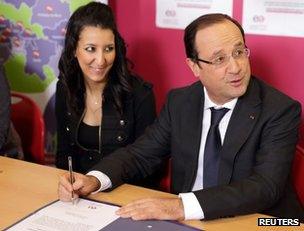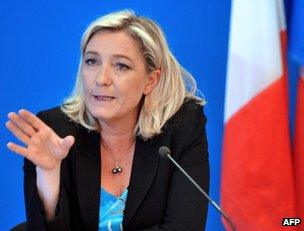The struggle to get France working again
- Published
.gif)
French student Julie Tissier is unsure of her job prospects in France - like many young people hit by the recession
Half of young French people have thought about living and working abroad. Julie Tissier, 22, a student at the Sorbonne, is one of them.
"I have thought about becoming become a teacher," she said.
"They always need teachers here in France don't they? They always accept teachers. But then I'm also working on an international trade diploma.... and if I wanted to change jobs I am not sure I'd be able to find any work here in France."
There is good reason why the pessimism might override the optimism of youth: 27% of young people (under the age of 35) in France are out of work.
Which is why the lure of a foreign job is growing.
The total number of unemployed in France rose by 36,900 in March to 3,224,000, beating the record of 3,195,000 set in 1997.
Two-thirds of the unemployed have been searching for work for more than a year.
Disillusionment
"It isn't just President [Francois] Hollande's fault," said Julie.
"When people voted for Hollande, they thought he could solve everything, that everything would be perfect, like another Obama, a superhero. Now they're disappointed, he's nothing special they say - but no president can fix everything in the current global crisis."

President Hollande has been promoting his "generation contracts" scheme
She is right. There are plenty who are disillusioned. As Mr Hollande approaches the anniversary of his election next month, his approval ratings languish at a measly 27%. No president has fallen faster or further in the first year of office and no doubt it is unemployment that weighs on those poll figures.
With the economy stalled and the government planning some 60bn euros (£50.9; $78.2bn) in public spending cuts between now and 2017, the room for manoeuvre is small.
But Mr Hollande has done what he can to tackle unemployment and youth unemployment in particular. There have been generous subsidies for companies that hire employees aged between 16 and 25 for at least one year. As part of that programme they created so-called "generation contracts".
Those small companies that hire young people, while still committing to keep an employee over 57 on the payroll, will win special subsidies. The scheme is supposed to ensure that older workers keep their jobs while passing on their skills and knowledge to younger talent.
The government hopes to sign half a million of these contracts over the next five years. It has even taken on 2,000 extra employees at the National Agency for Employment to help organise and encourage these kinds of contracts.
"You ask if I am still convinced we can reduce the rise in [unemployment] this year," said Mr Hollande.
"It's not a question of conviction. We will stick with the measures we have taken these past few months... but the reversal will not be seen before the end of this year."
Looking abroad
That opinion is shared by the Organisation for Economic Co-operation and Development. France will only start creating jobs if the economy begins to grow and in the last two quarters the economy has stagnated.
The right-wing opposition blames President Hollande's tax policy for damaging investment and undermining confidence in the economy.
Mr Hollande is hoping that a 20bn-euro tax break for companies will offset some of that criticism while reducing the labour costs that have suffocated inward investment.
There are no reliable statistics to tell us how many people might be heading abroad but the signs are there.
More French people live in London than in Bordeaux, Nantes or Strasbourg - some now regard it as France's sixth biggest city in terms of population.
"It would make a lot of sense to look overseas," said Aurore da Silva, 19, who also studies at the Sorbonne.
"I'm not too worried yet. I've got a summer internship sorted. But yes, I have looked overseas, particularly at London. I worry, as an outsider, that it's a lot harder to find work in foreign countries."
Le Pen boost
The social impact on young jobless people is dramatic - right across Europe. They are bearing the brunt of the eurozone crisis. And that plays into the hands of the parties on the fringe. In May's election in France, 18% of young voters (between 18 and 24) voted for the Front National (FN).

Marine Le Pen blames globalisation and Brussels for the economic troubles
For the FN leader, Marine Le Pen, it is a now-or-never moment.
Her message is aimed at the "ordinary French citizens". Simply put: France must regain its former glory; it must reindustrialise to grow; exit the euro, throw up barriers against immigration and cheap Chinese imports.
The campaign slogan is "Marine Le Pen: Voice of the People, Spirit of France". For the first time in 30 years those who see the FN as a danger for democracy are no longer the majority (47% do versus 47% who do not).
"He [Mr Hollande] is not making decisions," she said in a recent interview.
"He's putting in place austerity which is complete stupidity because austerity destroys the economy and increases unemployment, forces factories to move elsewhere and leads to the destruction of industries...
"This is not 'his' mistake because he's not deciding anything. He's just serving globalisation and applying decisions taken in Brussels."
'Unsustainable'
It worries the eurocrats. In recent weeks there has been a change in tack in Brussels - and also within the IMF - that austerity is not working, in France, Britain or the southern European periphery.
The European Commission President, Jose Manuel Barroso, said on Monday: "While I think this [austerity] policy is fundamentally right, I think it has reached its limits.
"Even if the policy is correct, the current pace [of cuts] will not be sustainable politically and socially."
Mr Hollande has argued the same point.
Since December 2012 he has been challenging Germany's hard line on austerity. His campaign slogan "Change Now" energised the young French voters.
Of voters aged between 18 and 24, 57% opted for Mr Hollande. The critics would say he failed to prepare them for the shock. Unemployment has risen in every month of his presidency.
Turning that around remains his biggest challenge.
- Published25 April 2013
- Published10 April 2013